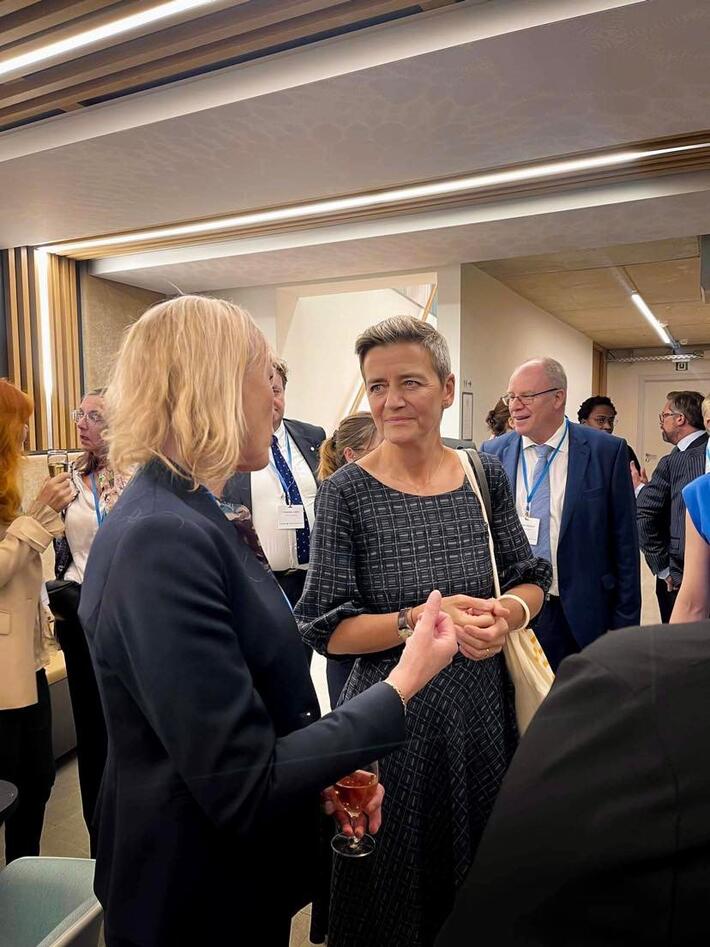Nordic University Days 2022
Over 60 rectors and vice-rectors from Nordic universities gathered alongside top EU-officials in Brussels to participate in the second edition of Nordic University Days (NUD).

Main content
High-level talks
In September, the University of Bergen alongside several other nordic unviersities co-hosted a conference gathering 60 rectors and vice-rectors in Brussels. Despite two postponements due to the pandemic, the second edition of NUD managed to deliver a packed schedule with representation from the European Commission, European Parliament and representatives from Missions to the EU. Among the European actors was the Vice-President of the EU-commission, Margrethe Vestager, president of the European Research Council, Maria Leptin, and acting director general for research and innovation in the EU-commission Signe Ratso. The rectors participated in high-level talks over two days, where a wide range of topics was covered:
- Visions of 2030 for European Research, Innovation and Education,
- The European Strategy for Universities – Synergies and Possibilities
- Green and Digital Transitions, Cooperation in Science and Innovation – in Europe and Internationally
- Key Nordic Recommendations for Excellence in the European Cooperation on Education, Research & Innovation
Key messages
NUD presented Nordic universities with a unique opportunity to highlight their priorities and visions for academia in direct contact with EU policymakers. In a long-term perspective, this aims at having effects both on legislation and framework programs such as Horizon Europe and Erasmus+.
Position papers on research and education by European university associations and Nordic universities made up the key messages that laid the baseline for the event. Throughout the conference, these messages were referenced by EU-actors and Nordic actors alike.
They were divided into six main priorities:
1. Academic freedom; a priority for Nordic universities
Academic freedom and institutional autonomy are essential to solve global challenges; everything from teaching and learning, to disseminating and publishing research should be free from exterior pressures. Accordingly, both the European Research Area (ERA) and the European Education Area (EEA) need to fortify and support efforts from academic organizations concerning academic freedom.
2. Science–based policy making
Universities play an essential role in sustainable, high-quality policymaking and regulations, in everything from climate change to health crises. However, researchers commonly report problems to do with disseminating high-quality information because of lack of time, support, resources, and incentives to engage with policy. Furthermore, it is an increasing problem that scientist who do engage with policy making and regulation are the subject of threats and harassment, as seen during the COVID-19 pandemic.
3. Joint implementation of the European Research Area (ERA) and European Education Area (EEA)
Without alignment between the Higher Education system within Member States and the European Commission, there is a risk that reforms on higher education and research policy will not materialize. Universities are the main actors in implementing the ERA policy agenda and the European Strategy for Universities, and therefore their perspectives and experiences should play a bigger role in the decision-making process. Through the ERA Transition Forum and the ERA policy agenda, Higher Education Stakeholders must receive a more prominent position in designing and implementing the new ERA.
4. Research and education based on excellence
Excellence is and must continue to be the primary guiding principle when it comes to investment in research, education and innovation which enhances sustainable growth and resilience in our societies. To find solutions to global and European challenges, excellence in science is a necessity. This in return requires joint actions and investments in science and innovation, as well as participatory and empowered citizens. The new ERA and the European Strategy for Universities have in large part been conceived to facilitate the contribution of European R&I to the twin transition.
5. Universities in a global landscape
To deliver on the twin transition as well as to boost competitiveness and develop solutions, we must cooperate on R&I with countries outside of the EU. Pointing out foreign interference as an increasing threat is important but is not in itself a reason to abstain from international cooperation. Political interference can just as well be domestic. The EU should promote science collaboration globally and enter strategic differentiated R&I partnerships with third countries based on common values and principles that promote the importance of academic freedom and institutional autonomy, research integrity & ethics, open science and gender equality.
6. The future of EU research and innovation programs: excellence and openness
Global challenges have to be solved through global solutions. Openness must remain a vital part of the remaining years of Horizon Europe, and for future cooperation. All allocation of research funding should be based on a criterion of quality and global excellence - from theoretical to problem-driven research and across all technology readiness levels.
Nordic universities are committed to preserving and protecting the freedom of research and to maintaining research environments that are open and that promote the free exchange of research results.
